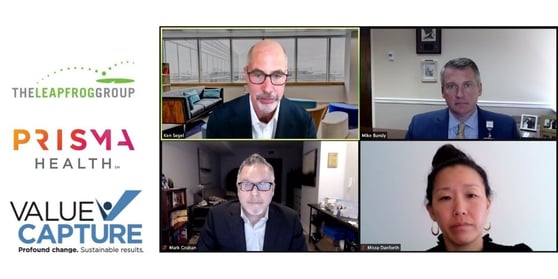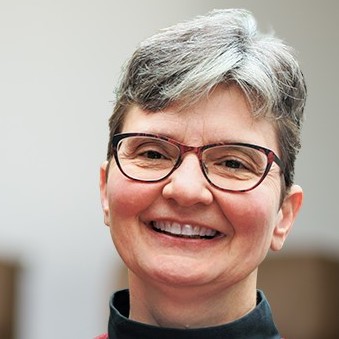Leaders and employees throughout every healthcare organization know too well how precious time really is - and how often it is spent on tasks that fail to deliver value to patients. Medication stock-outs, incomplete charts when physicians round, and even breakfast trays missing syrup packets all steal time from providers, and thus steal time from patient care.
Mike Bundy, CEO of Prisma Health Baptist Hospital and Prisma Health Baptist Parkridge Hospital, homed in on this issue in our recent webinar, “Habitual Excellence Starts with Safety: Before, During and After a Crisis.”

In this post, we focus on Mike (and his team) leading the work of tackling the problem of wasted time, and how working relentlessly toward the goal of “zero process outliers” created more time for providers to better serve patients with more focused, more timely, higher quality care.
Please be sure to dive more deeply into the details on how support services, such as dietary, worked with clinical units to understand root causes and eliminate the wasted time impacts of seemingly simple problems, like syrup missing from a patient breakfast tray, in our previous blog post: “Highlights From Our First Webinar: Pancake Syrup and Raking Leaves as a Path to Safety & Quality.”
Leaders Set the Tone: Driving All Waste from Core Processes
When Mike joined Prisma Health early in 2019, he recalls,“The Prisma Health CEO, Mark O’Halla, challenged us with the relentless pursuit of perfection.”
With his leader having set the tone and given the charge, Mike incorporated lessons he’d learned more than a decade prior, in working with Paul O’Neill and Value Capture; these lessons included:
- Theoretical-limits thinking (seeking perfection in all you do) to eliminate process variability;
- It is the job of leaders to set clear expectations that everyone, from the C-suite to the frontline, continually seek and suggest ways to improve the work; and,
- Only leaders can create the conditions that allow their workforce to thrive and innovate, such as by removing barriers and silos, and modeling the behaviors associated with habitual excellence.
Mike knew that zero harm and zero outliers are possible. He said, “We began looking, when you have a harm event and you're in RCA [root cause analysis] after RCA, it's the caregivers who are always the first part of that conversation....Saying zero harm is one thing, but we had to boil that down to not just the caregivers but each ancillary and support contributor as a foundation to our work. The common theme that we've all heard in RCA after RCA is time. They were in a hurry. They had another task to get to. They had another patient to get to.”
How much time could we give back to them, and then how close to the theoretical limits could they execute nursing processes in with the time we gave them back? What impact could that have on qualitative outcomes?
Where the rubber meets the road is the in-the-workplace, in-person leadership and training of Mike and his teams. Moreover, these leaders participate in daily tiered huddles, the management system structure that is used to surface, rapidly escalate problems, and share solutions.
Coaching to Lead Improvement
Mike said, “We set out to train every supervisor and above on the very basic concepts of micro PI [performance improvement] for their daily work to build systems with daily real-time measurements that lead to organizational transparency in real-time reporting for each function. It all aligns with the One Prisma tiered safety huddle system that's in place across our company.”
Critically important is the fact that Mike and the leadership teams aren’t simply cheering from the sidelines. Mike himself led 40 “micro PI” training sessions. Embedded into the training was the explicit conferral of ownership, accountability, and support.
Mike added, “We began a vigorous training implementation of teaching micro PI, daily process management all the way down to the supervisor level.
I decided at that point that this is the most important thing that we're doing as a team. I started every session that I taught personally, there's probably 40 or 41 of them, that, ‘As your CEO on this campus, I am leading it and I am teaching it. I'm teaching it every time to everyone, because I believe it is the very most important thing that we can do as an organization right now.’
“I would say personally to them, eyeball to eyeball, ‘At the end of this time together, I want you to be able to identify and outline what the ideal state is for your key daily processes, whether you're delivering trays, you're putting labs on the chart, you're stocking a Pyxis machine.'"
"I want you to know what your core fundamental processes are that impact your team members' work. I want you to be trained to do direct observation of what your existing process is, and then be able to do a simple gap analysis between what you observed is a current process and what you would have identified as ideal."
Then, bringing to life a page from the O’Neill playbook, Mike and his team removed excuses that the frontline leaders raised, such as lack of time.
Mike recalled, “We said that we were going to build the clipboards and stopwatches if it required that to begin making meaningful changes in real time. Then, we'll fix things one outlier at a time, and we're going to celebrate successes together and share our learning across the organization.”
Setting Expectations
As problems were identified and analyzed via rigorous problem-solving and coaching processes, the tiered huddle and help chain processes and communications functioned more effectively, bringing real effect to the term, “in real time.” Further, daily accountability helped accelerate improvements.
Mike told his teams what was expected from them in the daily huddles -- He said, "This is how we supported the caregivers from environmental services and bed turn times. This is how we supported the caregivers from a pharmacy with Pyxis stockouts yesterday. This is how we supported a campus from the supply chain, from transport, from all of those different departments."
“It's not OK to just say, ‘We performed at 91 or 92 percent.’ What's really important is that you're able to transparently say, ‘These are my six outliers. This is what our supervisors or our team members were able to do to make sure that outlier never happens again.’ Or, ‘This is what they escalated to me as their leader, and I'm escalating to you, Mike, as my leader, that I need to keep that process variation from occurring again,’ and then using the One Prisma Health system cascading huddles to share that learning in real time across the organization."
Mike provided vital context for the importance of the huddles as a substantive part of the process, not just a check-the-box exercise.
“What that does to the individual team member is it sets and creates the mindset in their daily work that we're not just going through the motions.”
When our processes are not producing the results, the expectation is we know why, and we take immediate action so that that variation never ever occurs again, or we escalate it to those that can help us get it done. It's not OK to do PI on a piece of butcher block paper with sticker voting and we all align ourselves on what we want to work on next month at the PI meeting. It's about making real-time impact in those processes and in real time, sharing your learning.
No One is Resting on the Laurels
Mike shared some impressive patient safety results from the Baptist Parkridge campus (this hospital was named a Leapfrog Top 10 General Hospital at the end of 2020).
Mike relayed the following:
“On the Parkridge campus, they went 552 days without a CAUTI. 469 days without a CLABSI. 177 days with no C. diff. 426 days since a colon SSI. 77 days since a hysterectomy SSI. 335 days since a hip SSI. 2,548 days since a knee SSI. 2,548 days since a VAP."
“What's interesting about these numbers is that since this data set was put together, we had a CAUTI at Parkridge. This process never stopped. The team was just as engaged, if not a little enraged, in the pursuit of understanding why, down to the root cause. I'm proud of them.
Just like saying the continued pursuit of the theoretical limits doesn't stop with an external condition, like when it gets difficult like a pandemic, it also doesn't stop because you have a solid history.
The lazy leadership could say, 'Well, it's just one, right? We went a long time without one.' I haven't seen an airline commercial yet that celebrates the thousandth safe landing.
Living, Breathing, Continually Improving Proof: With Leadership, Everything is Possible
Paul O’Neill often said, “With leadership, everything is possible. Without it, nothing is.”
Mike Bundy and his teams, as across the entire Prisma Health system, embody Paul’s quote. The patients and communities of Prisma Health are absolutely better for it.
To learn more about the leadership principles of Paul O'Neill, Sr., and the continuing influence he has on leaders today, please check out our two e-books, A Playbook for Habitual Excellence: A Leader's Roadmap from the Life and Work of Paul H. O'Neill, Sr., and Lasting Impact: Leaders Share Lessons from Paul H. O'Neill, Sr.
To learn more about Value Capture and how we may be able to help you work toward zero process outliers, please complete our Contact Form.

Written by Melissa Moore
Ms. Moore’s responsibilities center on marketing and communications. Prior to joining Value Capture, she served as a Marketing Manager at Reed Smith, a global law firm. Other career steps include: co-founding and operating a trend-setting coffeehouse; securities lawyer; and, service and equipment sales.


Submit a comment